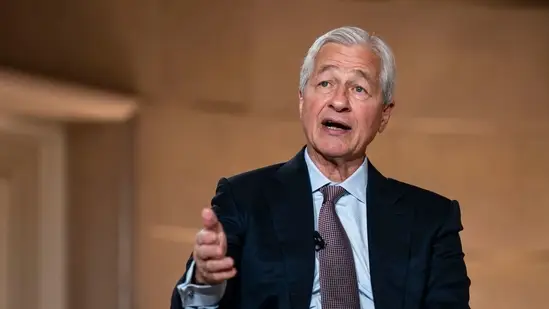“JP-Morgan CEO’s Advice to Trump Amid Trade War Concerns: ‘Nations such as India…'”

“JP Morgan CEO’s Advice to Trump: Strengthening Trade Ties with India”
JPMorgan Chase & Co. CEO Jamie Dimon raised concerns about U.S. President Donald Trump’s tariffs and their potential economic consequences. In his annual letter to shareholders, Dimon urged the U.S. government to focus on strengthening trade ties with emerging economies like India, rather than pressuring them to align with U.S. interests. Dimon’s remarks come amid the escalating trade war and highlight the growing risks for the U.S. economy.
Dimon’s Warning: The Risks of Inflation and Slower Growth
Dimon cautioned that President Trump’s tariffs could significantly raise inflation and slow U.S. economic growth. He noted that the tariffs would likely drive up the prices of both imported and domestic goods. “The tariffs introduced recently are expected to drive up inflation and are causing many to consider a greater probability of a recession,” Dimon said. He emphasized that while tariffs may not immediately trigger a recession, they will likely reduce the pace of economic growth.
Dimon pointed out that the rise in input costs, caused by tariffs, would increase the price of goods manufactured both domestically and abroad. Consumers will feel the impact of these higher costs, and businesses will face challenges in maintaining competitive pricing. Dimon warned that these inflationary pressures could harm both businesses and households across the country.
Strengthening Trade Relations with India and Other Emerging Economies
Dimon suggested that the U.S. should focus on developing stronger trade relationships with emerging markets like India and Brazil, rather than pressuring them to adopt U.S. policies. He recommended that Washington extend a “friendly hand” to nonaligned countries, as they represent valuable opportunities for trade and economic collaboration. Specifically, Dimon pointed to the 26% tariff on India and 10% tariff on Brazil, noting that these countries, while growing rapidly, are still subject to significant trade barriers.
By working to remove these barriers, Dimon argued that the U.S.could enhance its influence on the global stage economy. He emphasized that India, with its growing economy and large consumer base, could offer immense opportunities for American businesses. Strengthening ties with such markets could help the U.S. weather the storm created by ongoing trade disputes, particularly with China.
The Impact of Trade Wars on U.S. Businesses
Dimon highlighted the challenges U.S. businesses face due to the ongoing trade war, especially those that rely on global supply chains. U.S. companies that import raw materials or finished products from other countries have already begun to feel the effects of the tariffs. Dimon warned that the higher costs would likely be passed down the supply chain, leading to increased prices for consumers. This could spark inflation, further exacerbating the difficulties faced by businesses and households.
Despite these concerns, Dimon maintained that a more balanced approach to trade policy could help mitigate some of the negative consequences. By strengthening relationships with other growing economies like India, the U.S. could provide businesses with new opportunities and reduce their reliance on volatile trade relations with countries like China. Dimon argued that this approach could help stabilize the U.S. economy in the long term.
Dimon’s View on U.S. Economic Turbulence and Global Challenges
Dimon’s letter also addressed the broader geopolitical and economic challenges facing the U.S. He warned that ongoing trade disputes, inflation, and high fiscal deficits could create significant turbulence for the economy. While Dimon acknowledged that tax reforms and deregulation had brought some positive changes, he noted that these gains could be offset by the negative impacts of tariffs, high inflation, and political instability.
Dimon’s concerns extended beyond trade. He pointed out the risks associated with rising asset prices, global volatility, and the potential for a prolonged period of economic stagnation. He urged policymakers to carefully balance their approach to trade, taxes, and regulations to avoid exacerbating the current economic challenges.
The Role of Tax Reforms and Deregulation in Supporting U.S. Growth
In his letter, Dimon recognized that tax reforms and deregulation have had positive effects on the U.S. economy, particularly in terms of boosting corporate profits. However, he cautioned that the benefits of these reforms could be overshadowed by the negative effects of the trade war and rising inflation. Dimon noted that while deregulation has helped stimulate business investment, the economic challenges posed by tariffs and high inflation could hinder long-term growth.
Dimon called for a more balanced approach, one that takes into account both the positives of tax reform and the negatives of trade wars. He emphasized that while tax cuts and deregulation could help businesses, they must be part of a broader strategy that focuses on maintaining stability in the face of global economic challenges.
Conclusion: A Strategic Path Forward for U.S. Trade Policy
Dimon’s letter to shareholders served as a reminder of the complex economic landscape facing the U.S. His advice to President Trump and the U.S. government was clear: focus on strengthening trade ties with emerging markets like India, Brazil, and others, and avoid escalating trade conflicts that could harm the U.S. economy in the long run. By fostering better relationships with countries that are growing rapidly, the U.S. can help mitigate some of the negative impacts of the ongoing trade war and set itself on a path toward sustainable economic growth.
As Dimon noted, the U.S. economy faces many challenges, but with careful planning and strategic policymaking, the country can navigate these turbulent times. Strengthening international trade relationships and maintaining a balanced approach to economic policy will be crucial to ensuring the long-term stability and growth of the U.S. economy.






